Analyzing Cross-Cultural Communication: Business in China
VerifiedAdded on 2023/06/13
|6
|2027
|148
Essay
AI Summary
This essay explores cross-cultural communication challenges for an Australian business, "The Aroma Shop," seeking to penetrate the Chinese market. It examines essential Chinese business etiquette that Mary, the owner, needs to understand before meeting with Mr. Lau. The essay discusses the importance of relationship building, preparedness, and hierarchical respect in Chinese business culture. It also highlights potential challenges related to product acceptance due to differing tastes. Furthermore, the essay applies Hofstede's cultural dimensions model to compare Australia and China, focusing on power distance, individualism, masculinity, uncertainty avoidance, long-term orientation, and indulgence. Recommendations for open-minded communication, cultural sensitivity, and language training are provided to improve cross-cultural business interactions. The essay concludes by emphasizing the significance of cultural awareness and effective communication for successful international business ventures, suggesting that Mary should consider these factors to ensure a positive meeting and potential market entry for "The Aroma Shop" in China. Desklib provides similar solved assignments for students.
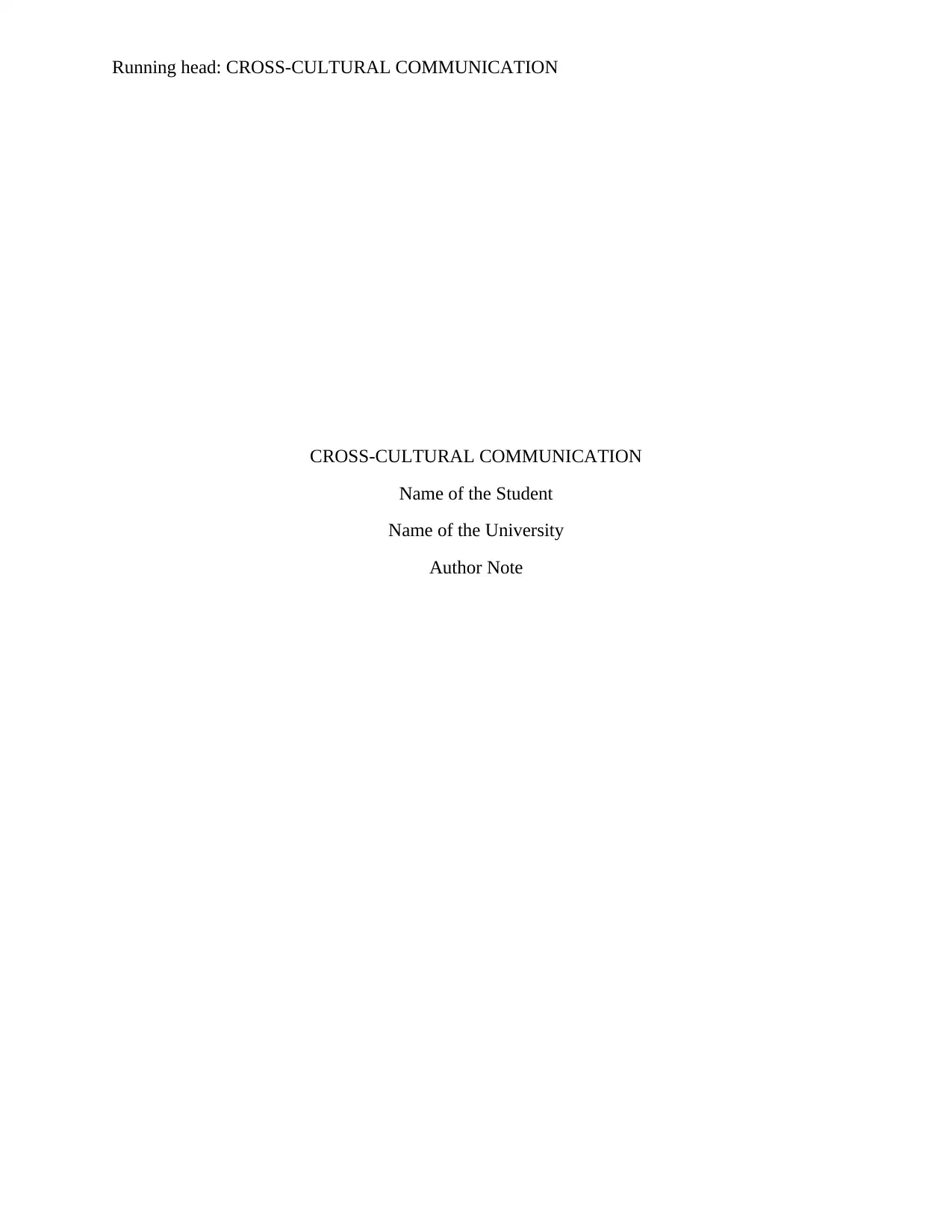
Running head: CROSS-CULTURAL COMMUNICATION
CROSS-CULTURAL COMMUNICATION
Name of the Student
Name of the University
Author Note
CROSS-CULTURAL COMMUNICATION
Name of the Student
Name of the University
Author Note
Paraphrase This Document
Need a fresh take? Get an instant paraphrase of this document with our AI Paraphraser
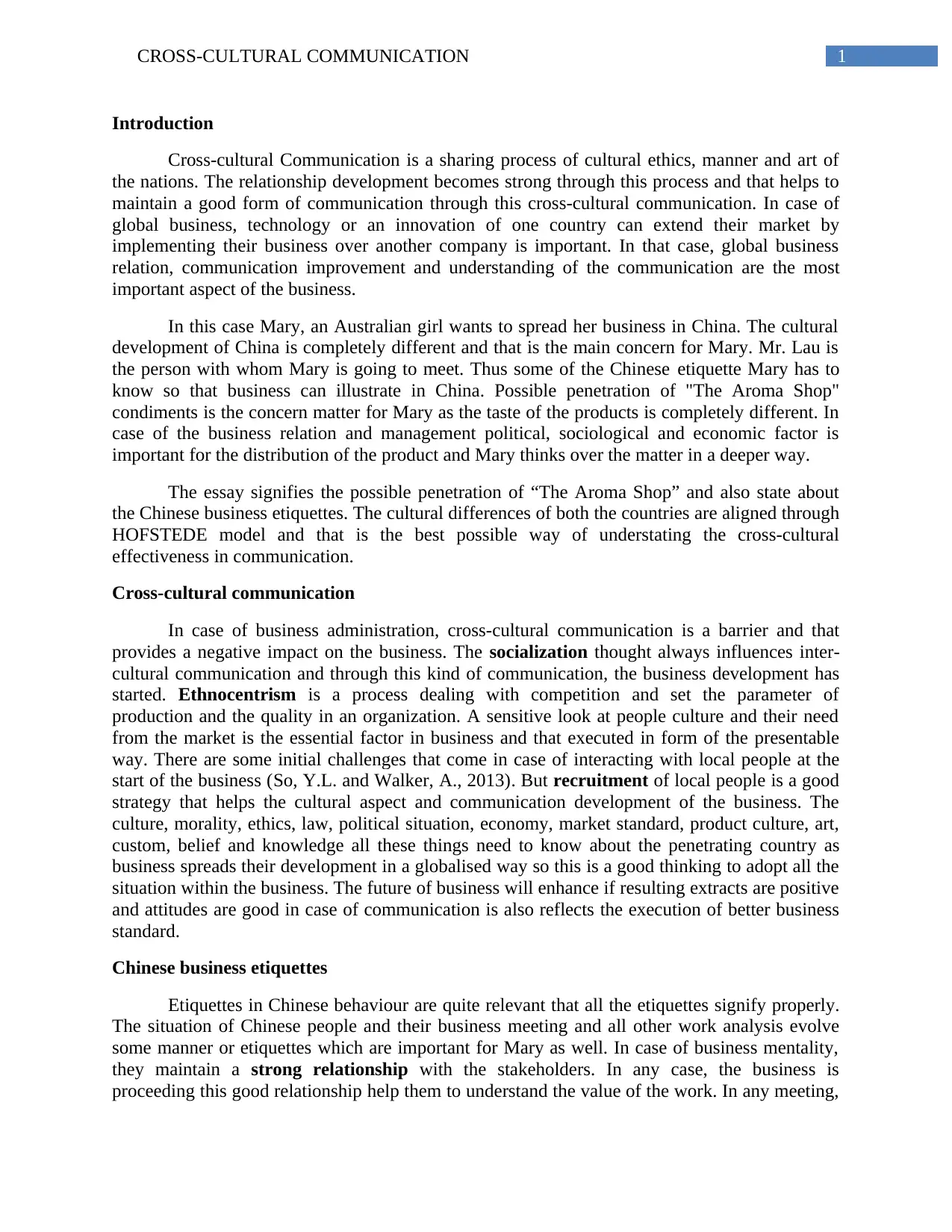
1CROSS-CULTURAL COMMUNICATION
Introduction
Cross-cultural Communication is a sharing process of cultural ethics, manner and art of
the nations. The relationship development becomes strong through this process and that helps to
maintain a good form of communication through this cross-cultural communication. In case of
global business, technology or an innovation of one country can extend their market by
implementing their business over another company is important. In that case, global business
relation, communication improvement and understanding of the communication are the most
important aspect of the business.
In this case Mary, an Australian girl wants to spread her business in China. The cultural
development of China is completely different and that is the main concern for Mary. Mr. Lau is
the person with whom Mary is going to meet. Thus some of the Chinese etiquette Mary has to
know so that business can illustrate in China. Possible penetration of "The Aroma Shop"
condiments is the concern matter for Mary as the taste of the products is completely different. In
case of the business relation and management political, sociological and economic factor is
important for the distribution of the product and Mary thinks over the matter in a deeper way.
The essay signifies the possible penetration of “The Aroma Shop” and also state about
the Chinese business etiquettes. The cultural differences of both the countries are aligned through
HOFSTEDE model and that is the best possible way of understating the cross-cultural
effectiveness in communication.
Cross-cultural communication
In case of business administration, cross-cultural communication is a barrier and that
provides a negative impact on the business. The socialization thought always influences inter-
cultural communication and through this kind of communication, the business development has
started. Ethnocentrism is a process dealing with competition and set the parameter of
production and the quality in an organization. A sensitive look at people culture and their need
from the market is the essential factor in business and that executed in form of the presentable
way. There are some initial challenges that come in case of interacting with local people at the
start of the business (So, Y.L. and Walker, A., 2013). But recruitment of local people is a good
strategy that helps the cultural aspect and communication development of the business. The
culture, morality, ethics, law, political situation, economy, market standard, product culture, art,
custom, belief and knowledge all these things need to know about the penetrating country as
business spreads their development in a globalised way so this is a good thinking to adopt all the
situation within the business. The future of business will enhance if resulting extracts are positive
and attitudes are good in case of communication is also reflects the execution of better business
standard.
Chinese business etiquettes
Etiquettes in Chinese behaviour are quite relevant that all the etiquettes signify properly.
The situation of Chinese people and their business meeting and all other work analysis evolve
some manner or etiquettes which are important for Mary as well. In case of business mentality,
they maintain a strong relationship with the stakeholders. In any case, the business is
proceeding this good relationship help them to understand the value of the work. In any meeting,
Introduction
Cross-cultural Communication is a sharing process of cultural ethics, manner and art of
the nations. The relationship development becomes strong through this process and that helps to
maintain a good form of communication through this cross-cultural communication. In case of
global business, technology or an innovation of one country can extend their market by
implementing their business over another company is important. In that case, global business
relation, communication improvement and understanding of the communication are the most
important aspect of the business.
In this case Mary, an Australian girl wants to spread her business in China. The cultural
development of China is completely different and that is the main concern for Mary. Mr. Lau is
the person with whom Mary is going to meet. Thus some of the Chinese etiquette Mary has to
know so that business can illustrate in China. Possible penetration of "The Aroma Shop"
condiments is the concern matter for Mary as the taste of the products is completely different. In
case of the business relation and management political, sociological and economic factor is
important for the distribution of the product and Mary thinks over the matter in a deeper way.
The essay signifies the possible penetration of “The Aroma Shop” and also state about
the Chinese business etiquettes. The cultural differences of both the countries are aligned through
HOFSTEDE model and that is the best possible way of understating the cross-cultural
effectiveness in communication.
Cross-cultural communication
In case of business administration, cross-cultural communication is a barrier and that
provides a negative impact on the business. The socialization thought always influences inter-
cultural communication and through this kind of communication, the business development has
started. Ethnocentrism is a process dealing with competition and set the parameter of
production and the quality in an organization. A sensitive look at people culture and their need
from the market is the essential factor in business and that executed in form of the presentable
way. There are some initial challenges that come in case of interacting with local people at the
start of the business (So, Y.L. and Walker, A., 2013). But recruitment of local people is a good
strategy that helps the cultural aspect and communication development of the business. The
culture, morality, ethics, law, political situation, economy, market standard, product culture, art,
custom, belief and knowledge all these things need to know about the penetrating country as
business spreads their development in a globalised way so this is a good thinking to adopt all the
situation within the business. The future of business will enhance if resulting extracts are positive
and attitudes are good in case of communication is also reflects the execution of better business
standard.
Chinese business etiquettes
Etiquettes in Chinese behaviour are quite relevant that all the etiquettes signify properly.
The situation of Chinese people and their business meeting and all other work analysis evolve
some manner or etiquettes which are important for Mary as well. In case of business mentality,
they maintain a strong relationship with the stakeholders. In any case, the business is
proceeding this good relationship help them to understand the value of the work. In any meeting,
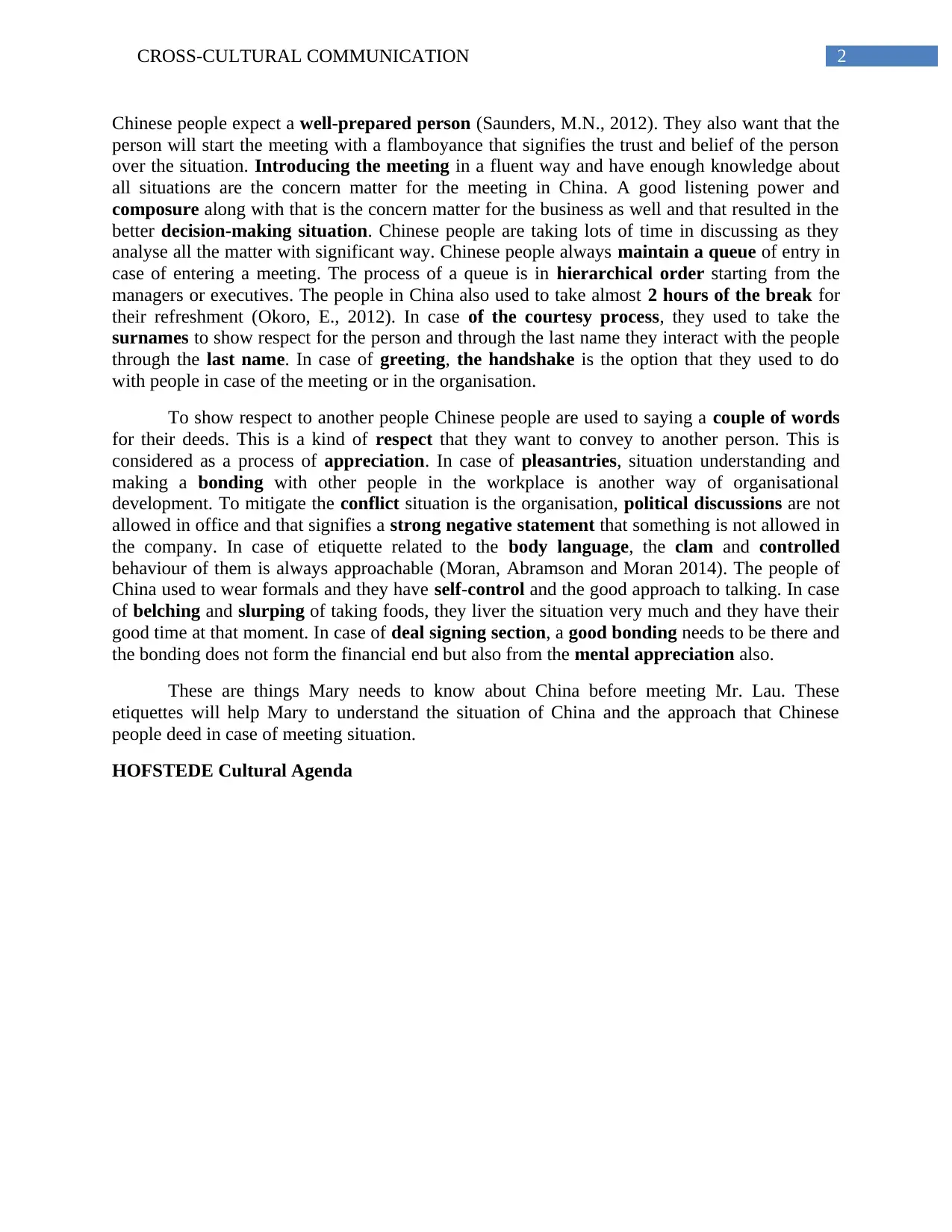
2CROSS-CULTURAL COMMUNICATION
Chinese people expect a well-prepared person (Saunders, M.N., 2012). They also want that the
person will start the meeting with a flamboyance that signifies the trust and belief of the person
over the situation. Introducing the meeting in a fluent way and have enough knowledge about
all situations are the concern matter for the meeting in China. A good listening power and
composure along with that is the concern matter for the business as well and that resulted in the
better decision-making situation. Chinese people are taking lots of time in discussing as they
analyse all the matter with significant way. Chinese people always maintain a queue of entry in
case of entering a meeting. The process of a queue is in hierarchical order starting from the
managers or executives. The people in China also used to take almost 2 hours of the break for
their refreshment (Okoro, E., 2012). In case of the courtesy process, they used to take the
surnames to show respect for the person and through the last name they interact with the people
through the last name. In case of greeting, the handshake is the option that they used to do
with people in case of the meeting or in the organisation.
To show respect to another people Chinese people are used to saying a couple of words
for their deeds. This is a kind of respect that they want to convey to another person. This is
considered as a process of appreciation. In case of pleasantries, situation understanding and
making a bonding with other people in the workplace is another way of organisational
development. To mitigate the conflict situation is the organisation, political discussions are not
allowed in office and that signifies a strong negative statement that something is not allowed in
the company. In case of etiquette related to the body language, the clam and controlled
behaviour of them is always approachable (Moran, Abramson and Moran 2014). The people of
China used to wear formals and they have self-control and the good approach to talking. In case
of belching and slurping of taking foods, they liver the situation very much and they have their
good time at that moment. In case of deal signing section, a good bonding needs to be there and
the bonding does not form the financial end but also from the mental appreciation also.
These are things Mary needs to know about China before meeting Mr. Lau. These
etiquettes will help Mary to understand the situation of China and the approach that Chinese
people deed in case of meeting situation.
HOFSTEDE Cultural Agenda
Chinese people expect a well-prepared person (Saunders, M.N., 2012). They also want that the
person will start the meeting with a flamboyance that signifies the trust and belief of the person
over the situation. Introducing the meeting in a fluent way and have enough knowledge about
all situations are the concern matter for the meeting in China. A good listening power and
composure along with that is the concern matter for the business as well and that resulted in the
better decision-making situation. Chinese people are taking lots of time in discussing as they
analyse all the matter with significant way. Chinese people always maintain a queue of entry in
case of entering a meeting. The process of a queue is in hierarchical order starting from the
managers or executives. The people in China also used to take almost 2 hours of the break for
their refreshment (Okoro, E., 2012). In case of the courtesy process, they used to take the
surnames to show respect for the person and through the last name they interact with the people
through the last name. In case of greeting, the handshake is the option that they used to do
with people in case of the meeting or in the organisation.
To show respect to another people Chinese people are used to saying a couple of words
for their deeds. This is a kind of respect that they want to convey to another person. This is
considered as a process of appreciation. In case of pleasantries, situation understanding and
making a bonding with other people in the workplace is another way of organisational
development. To mitigate the conflict situation is the organisation, political discussions are not
allowed in office and that signifies a strong negative statement that something is not allowed in
the company. In case of etiquette related to the body language, the clam and controlled
behaviour of them is always approachable (Moran, Abramson and Moran 2014). The people of
China used to wear formals and they have self-control and the good approach to talking. In case
of belching and slurping of taking foods, they liver the situation very much and they have their
good time at that moment. In case of deal signing section, a good bonding needs to be there and
the bonding does not form the financial end but also from the mental appreciation also.
These are things Mary needs to know about China before meeting Mr. Lau. These
etiquettes will help Mary to understand the situation of China and the approach that Chinese
people deed in case of meeting situation.
HOFSTEDE Cultural Agenda
⊘ This is a preview!⊘
Do you want full access?
Subscribe today to unlock all pages.

Trusted by 1+ million students worldwide
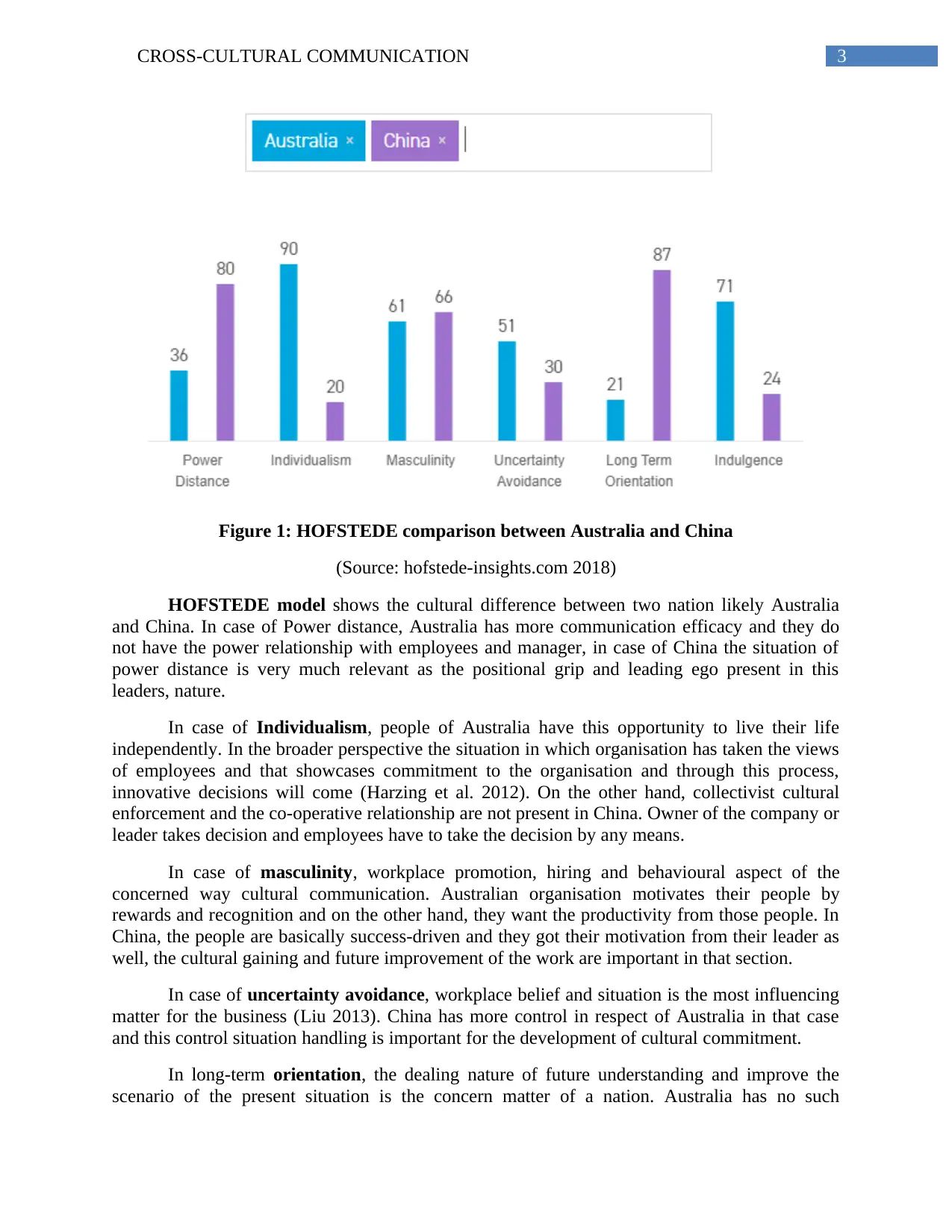
3CROSS-CULTURAL COMMUNICATION
Figure 1: HOFSTEDE comparison between Australia and China
(Source: hofstede-insights.com 2018)
HOFSTEDE model shows the cultural difference between two nation likely Australia
and China. In case of Power distance, Australia has more communication efficacy and they do
not have the power relationship with employees and manager, in case of China the situation of
power distance is very much relevant as the positional grip and leading ego present in this
leaders, nature.
In case of Individualism, people of Australia have this opportunity to live their life
independently. In the broader perspective the situation in which organisation has taken the views
of employees and that showcases commitment to the organisation and through this process,
innovative decisions will come (Harzing et al. 2012). On the other hand, collectivist cultural
enforcement and the co-operative relationship are not present in China. Owner of the company or
leader takes decision and employees have to take the decision by any means.
In case of masculinity, workplace promotion, hiring and behavioural aspect of the
concerned way cultural communication. Australian organisation motivates their people by
rewards and recognition and on the other hand, they want the productivity from those people. In
China, the people are basically success-driven and they got their motivation from their leader as
well, the cultural gaining and future improvement of the work are important in that section.
In case of uncertainty avoidance, workplace belief and situation is the most influencing
matter for the business (Liu 2013). China has more control in respect of Australia in that case
and this control situation handling is important for the development of cultural commitment.
In long-term orientation, the dealing nature of future understanding and improve the
scenario of the present situation is the concern matter of a nation. Australia has no such
Figure 1: HOFSTEDE comparison between Australia and China
(Source: hofstede-insights.com 2018)
HOFSTEDE model shows the cultural difference between two nation likely Australia
and China. In case of Power distance, Australia has more communication efficacy and they do
not have the power relationship with employees and manager, in case of China the situation of
power distance is very much relevant as the positional grip and leading ego present in this
leaders, nature.
In case of Individualism, people of Australia have this opportunity to live their life
independently. In the broader perspective the situation in which organisation has taken the views
of employees and that showcases commitment to the organisation and through this process,
innovative decisions will come (Harzing et al. 2012). On the other hand, collectivist cultural
enforcement and the co-operative relationship are not present in China. Owner of the company or
leader takes decision and employees have to take the decision by any means.
In case of masculinity, workplace promotion, hiring and behavioural aspect of the
concerned way cultural communication. Australian organisation motivates their people by
rewards and recognition and on the other hand, they want the productivity from those people. In
China, the people are basically success-driven and they got their motivation from their leader as
well, the cultural gaining and future improvement of the work are important in that section.
In case of uncertainty avoidance, workplace belief and situation is the most influencing
matter for the business (Liu 2013). China has more control in respect of Australia in that case
and this control situation handling is important for the development of cultural commitment.
In long-term orientation, the dealing nature of future understanding and improve the
scenario of the present situation is the concern matter of a nation. Australia has no such
Paraphrase This Document
Need a fresh take? Get an instant paraphrase of this document with our AI Paraphraser
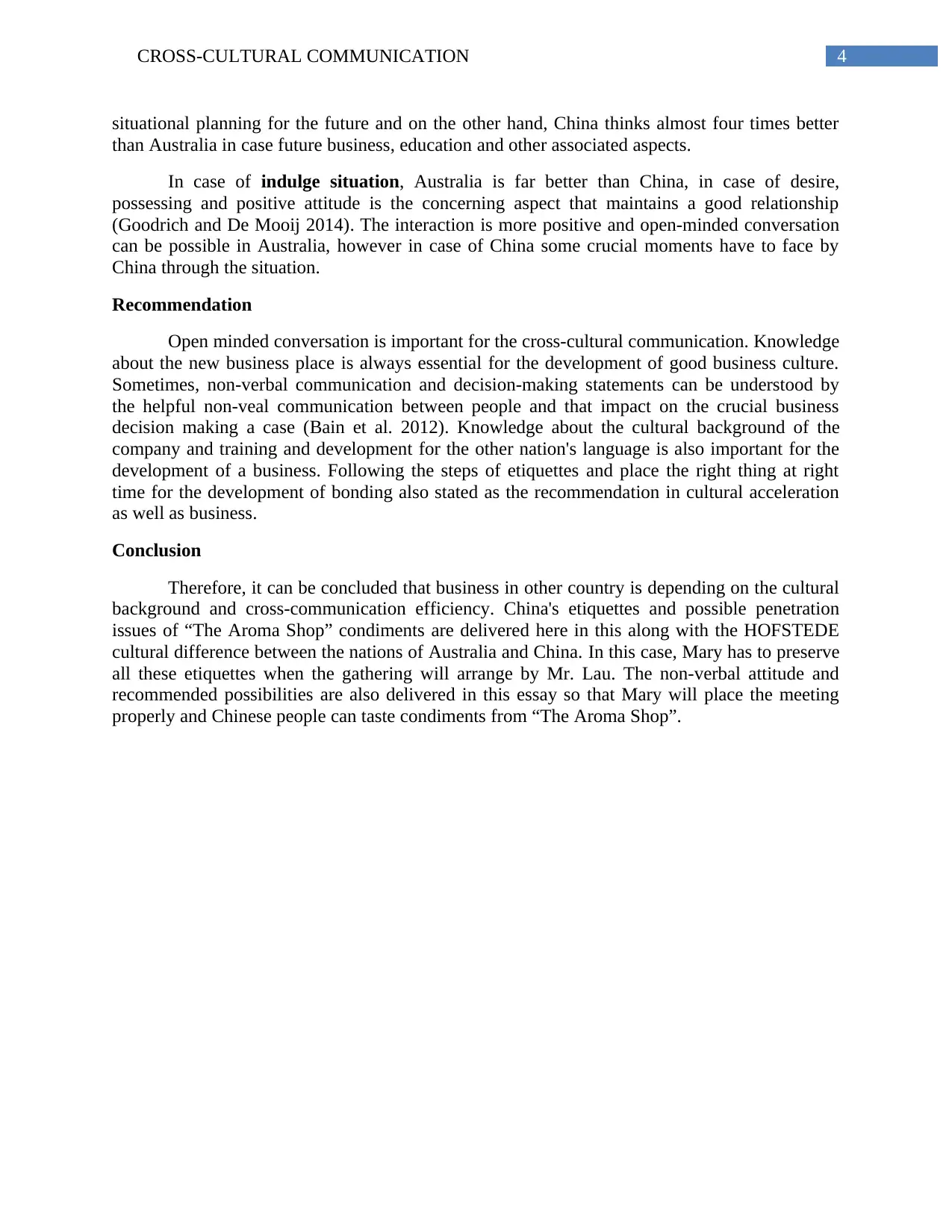
4CROSS-CULTURAL COMMUNICATION
situational planning for the future and on the other hand, China thinks almost four times better
than Australia in case future business, education and other associated aspects.
In case of indulge situation, Australia is far better than China, in case of desire,
possessing and positive attitude is the concerning aspect that maintains a good relationship
(Goodrich and De Mooij 2014). The interaction is more positive and open-minded conversation
can be possible in Australia, however in case of China some crucial moments have to face by
China through the situation.
Recommendation
Open minded conversation is important for the cross-cultural communication. Knowledge
about the new business place is always essential for the development of good business culture.
Sometimes, non-verbal communication and decision-making statements can be understood by
the helpful non-veal communication between people and that impact on the crucial business
decision making a case (Bain et al. 2012). Knowledge about the cultural background of the
company and training and development for the other nation's language is also important for the
development of a business. Following the steps of etiquettes and place the right thing at right
time for the development of bonding also stated as the recommendation in cultural acceleration
as well as business.
Conclusion
Therefore, it can be concluded that business in other country is depending on the cultural
background and cross-communication efficiency. China's etiquettes and possible penetration
issues of “The Aroma Shop” condiments are delivered here in this along with the HOFSTEDE
cultural difference between the nations of Australia and China. In this case, Mary has to preserve
all these etiquettes when the gathering will arrange by Mr. Lau. The non-verbal attitude and
recommended possibilities are also delivered in this essay so that Mary will place the meeting
properly and Chinese people can taste condiments from “The Aroma Shop”.
situational planning for the future and on the other hand, China thinks almost four times better
than Australia in case future business, education and other associated aspects.
In case of indulge situation, Australia is far better than China, in case of desire,
possessing and positive attitude is the concerning aspect that maintains a good relationship
(Goodrich and De Mooij 2014). The interaction is more positive and open-minded conversation
can be possible in Australia, however in case of China some crucial moments have to face by
China through the situation.
Recommendation
Open minded conversation is important for the cross-cultural communication. Knowledge
about the new business place is always essential for the development of good business culture.
Sometimes, non-verbal communication and decision-making statements can be understood by
the helpful non-veal communication between people and that impact on the crucial business
decision making a case (Bain et al. 2012). Knowledge about the cultural background of the
company and training and development for the other nation's language is also important for the
development of a business. Following the steps of etiquettes and place the right thing at right
time for the development of bonding also stated as the recommendation in cultural acceleration
as well as business.
Conclusion
Therefore, it can be concluded that business in other country is depending on the cultural
background and cross-communication efficiency. China's etiquettes and possible penetration
issues of “The Aroma Shop” condiments are delivered here in this along with the HOFSTEDE
cultural difference between the nations of Australia and China. In this case, Mary has to preserve
all these etiquettes when the gathering will arrange by Mr. Lau. The non-verbal attitude and
recommended possibilities are also delivered in this essay so that Mary will place the meeting
properly and Chinese people can taste condiments from “The Aroma Shop”.
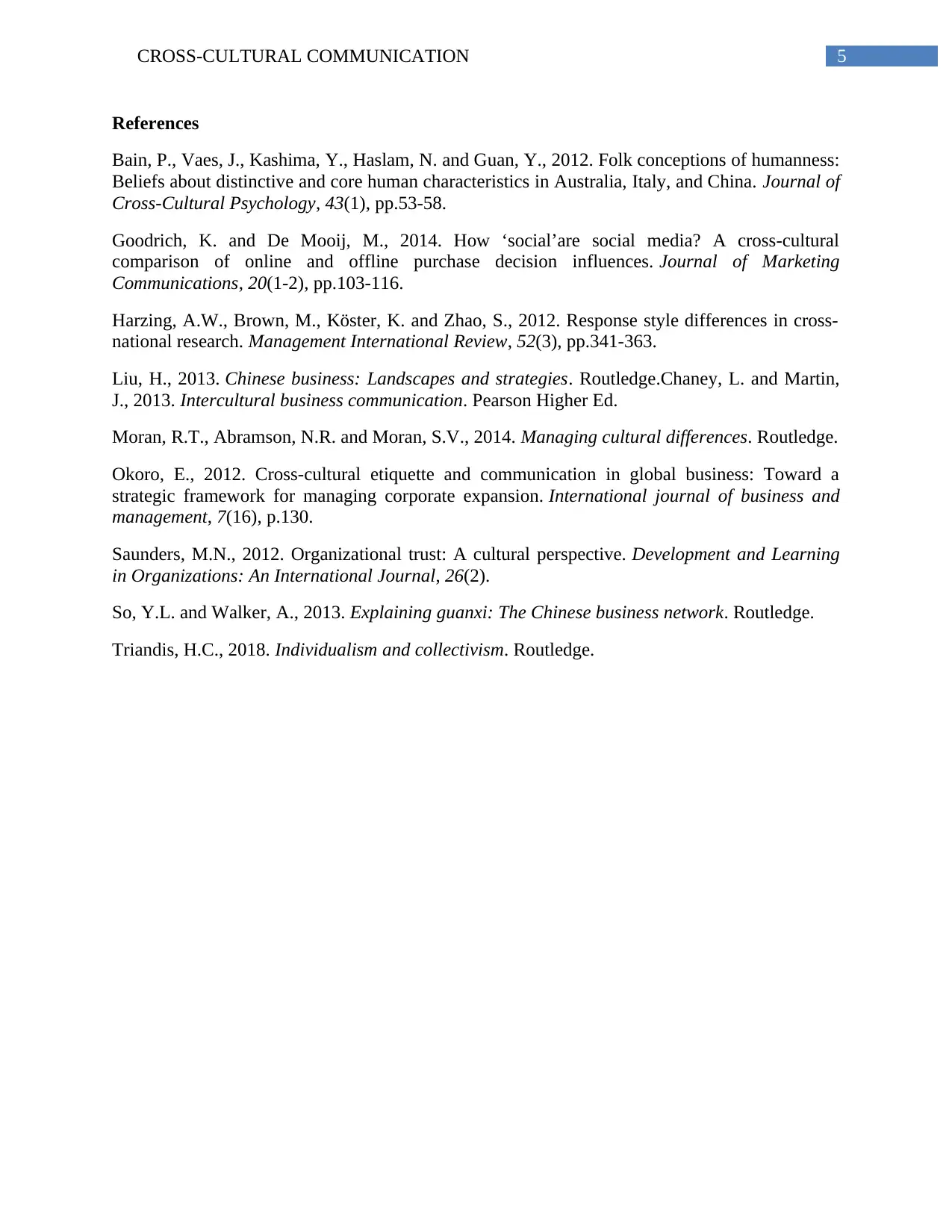
5CROSS-CULTURAL COMMUNICATION
References
Bain, P., Vaes, J., Kashima, Y., Haslam, N. and Guan, Y., 2012. Folk conceptions of humanness:
Beliefs about distinctive and core human characteristics in Australia, Italy, and China. Journal of
Cross-Cultural Psychology, 43(1), pp.53-58.
Goodrich, K. and De Mooij, M., 2014. How ‘social’are social media? A cross-cultural
comparison of online and offline purchase decision influences. Journal of Marketing
Communications, 20(1-2), pp.103-116.
Harzing, A.W., Brown, M., Köster, K. and Zhao, S., 2012. Response style differences in cross-
national research. Management International Review, 52(3), pp.341-363.
Liu, H., 2013. Chinese business: Landscapes and strategies. Routledge.Chaney, L. and Martin,
J., 2013. Intercultural business communication. Pearson Higher Ed.
Moran, R.T., Abramson, N.R. and Moran, S.V., 2014. Managing cultural differences. Routledge.
Okoro, E., 2012. Cross-cultural etiquette and communication in global business: Toward a
strategic framework for managing corporate expansion. International journal of business and
management, 7(16), p.130.
Saunders, M.N., 2012. Organizational trust: A cultural perspective. Development and Learning
in Organizations: An International Journal, 26(2).
So, Y.L. and Walker, A., 2013. Explaining guanxi: The Chinese business network. Routledge.
Triandis, H.C., 2018. Individualism and collectivism. Routledge.
References
Bain, P., Vaes, J., Kashima, Y., Haslam, N. and Guan, Y., 2012. Folk conceptions of humanness:
Beliefs about distinctive and core human characteristics in Australia, Italy, and China. Journal of
Cross-Cultural Psychology, 43(1), pp.53-58.
Goodrich, K. and De Mooij, M., 2014. How ‘social’are social media? A cross-cultural
comparison of online and offline purchase decision influences. Journal of Marketing
Communications, 20(1-2), pp.103-116.
Harzing, A.W., Brown, M., Köster, K. and Zhao, S., 2012. Response style differences in cross-
national research. Management International Review, 52(3), pp.341-363.
Liu, H., 2013. Chinese business: Landscapes and strategies. Routledge.Chaney, L. and Martin,
J., 2013. Intercultural business communication. Pearson Higher Ed.
Moran, R.T., Abramson, N.R. and Moran, S.V., 2014. Managing cultural differences. Routledge.
Okoro, E., 2012. Cross-cultural etiquette and communication in global business: Toward a
strategic framework for managing corporate expansion. International journal of business and
management, 7(16), p.130.
Saunders, M.N., 2012. Organizational trust: A cultural perspective. Development and Learning
in Organizations: An International Journal, 26(2).
So, Y.L. and Walker, A., 2013. Explaining guanxi: The Chinese business network. Routledge.
Triandis, H.C., 2018. Individualism and collectivism. Routledge.
⊘ This is a preview!⊘
Do you want full access?
Subscribe today to unlock all pages.

Trusted by 1+ million students worldwide
1 out of 6
Related Documents
Your All-in-One AI-Powered Toolkit for Academic Success.
+13062052269
info@desklib.com
Available 24*7 on WhatsApp / Email
![[object Object]](/_next/static/media/star-bottom.7253800d.svg)
Unlock your academic potential
Copyright © 2020–2026 A2Z Services. All Rights Reserved. Developed and managed by ZUCOL.



